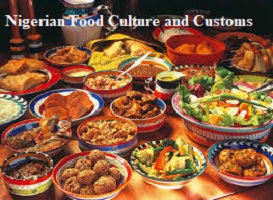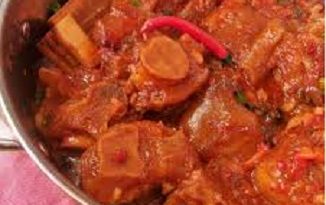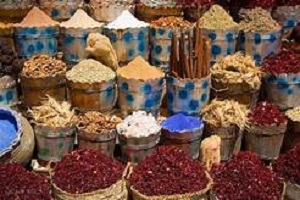Nigerian Food Culture and Customs: Three Yorùbá Sayings on It
Nigerian Food Culture and Customs

- Three Yorùbá sayings that explained the Nigerian food culture and customs
The Nigerian food culture varies according to ethnic group.
I’ve always attributed Nigeria’s enormous number of dishes to the country’s diverse ethnic groupings.
Nigeria is home to about 350 different ethnic groupings or tribe
Table of Contents
Nigerian Food Culture: Geographic Setting and Environment
Nigeria gets its name from the Niger River, which plays an essential role in Nigerian life.
It is not only a transportation route, but it is also an excellent source of fish, including carp, Nile perch, and catfish.
It also provides the water required for crop cultivation.
Nigeria is located on Africa’s west coast, near the mouth of the Gulf of Guinea (part of the Atlantic Ocean)
Comparing and Contrasting Three Cultural Food Customs from Nigeria
Nigeria is a multicultural country with a wide range of cultural cuisines. The majority of Nigerians’ cultural diet consists of staple foods supplemented by soup or stew.
In the South West and Eastern regions (where Yorubas and Igbos are the prominent ethnic groupings), basic foods include rice, beans, yam, and cassava by-products (garri, fufu, and lafun) eaten with stew or soup
Grains such as sorghum and millet are the predominant cuisine in Northern Nigeria (where the Hausas and Fulanis are the prominent ethnic groupings); these are eaten with palm oil-based soup cooked with tomatoes and okra. Meat is occasionally added.
Nigerian Cultural Food: History and Food
The flavors of African cuisine were largely influenced by trade.
Prior to the start of the intercontinental trade, the main staples were rice, millet (a type of grain), and lentils.
The first Europeans to arrive in Nigeria were the Portuguese.
Several dietary staples, such as beans, cassava, and maize, were introduced to Western Africa by European explorers and traders.
The explorers were introduced to these dishes.
Food in Nigerian Culture: Foods of the Nigerians
Nigeria is one of the most ethnically diverse countries in the world.
The Hausa and Yoruba make up approximately 21% of the population; the Igbo/Ibo, 18%; the Fulani, approximately 11%; and the Ibibio, 5%.
The remaining 23% is made up of various different groupings.
Nigeria has a diverse population and culture. Each region has a regional favorite based on customs, culture, and religion.
The various foods available also vary by season: the “hungry season” occurs before the rains arrive in March, while the “season of surplus” occurs after the harvest in October and November. Fruits, on the other hand, are consumed all year
Different food cultures ~ Food Nigerian Culture
Yoruba culinary culture will differ slightly from Hausa or Igbo food culture. This website, on the other hand, will concentrate on what is generally recognized in Nigeria.
This page is about Nigerian food customs and culture; if you are dating or married to a Nigerian, you should be familiar with all aspects of Nigerian food and culture.
Nigerian Food Cultures – Food Culture in Nigeria
In a Nigerian home, the men are expected to provide money for all the food while it is the duty of the woman to take care of the home, shop, and prepare the food.
The only exception is when the wife is gainfully employed. Then she might employ the service of house help.
About 30% of Nigerian women are stay-at-home mothers, with the majority working in petty trading or civil service.
Most Nigerian men dislike stressing out their wives. They feel more at ease when she is running the house, preparing delicious meals, and caring for the children.
That’s all there is to Nigerian food culture; now let’s talk about Nigerian food customs.
There are only a few food customs in Nigeria that are still practiced today.
Below are some significant food customs in Nigeria;
I would try and make a summary of all the diverse food customs of the major tribes in Nigeria. Some of them, as I previously indicated, are no longer in existence.
Nigerian Food Customs ~ Nigerian Food and Culture
- You must wash your hands before eating – As the name implies, washing your hands before eating prevents the spread of undesirable microorganisms from your hands to your stomach.
- Apply caution when eating meat and fish – this only applies when two people are eating together. We expect that the younger person will shun the meat and fish until the elderly person gives him his piece.
- Women always cook the foods – In a Nigerian kitchen, the woman is primarily responsible for food preparation. The male-only enters the kitchen when he feels like assisting; otherwise, he is expected to keep away from it.
- Women Must Cover Their Hair Before Cooking – I suppose this goes without saying, but the reason we expect a woman to cover her hair while cooking is so we don’t eat a hair strand or even see it in our food
- Avoid Talking While Eating – This is obviously to avoid any type of disaster while swallowing.
Most Nigerian foods have a lot of peppers, thus it’s best to be calm to avoid diverting foods to the wrong channel.
There are various additional dietary practices and cultures in Nigeria, some of which, as I previously indicated, are no longer in existence.
Nigerian Food Culture Facts
Most of the practices we used to impose are no longer practiced in families today, thanks to modern civilization.
They were engraved in stones by our forefathers so that every new family would have to go through them and learn to live by them.
But such is no longer the case, as the modern lifestyle has washed away much of Africa’s tradition and customs.
The initial objective of Nigerian food culture and practices was to ensure and nurture proper cooking and eating habits, and honestly, I believe it fulfilled this purpose while it lasted.
And sometimes I believe it wouldn’t harm to initiate those customs procedures again.
However, there is no law in Nigeria that enforces food culture and customs; the norms exist only in the minds of men.
Many people would believe that there is no need to enact or even write down these dietary practices because common sense would always remind you to follow them.
And I completely agree.
Mealtime Customs – Nigerian Cultural Food
Many Nigerians get up as early as 5 a.m. and eat a light breakfast to start their day.
Breakfast is usually rice – rice with stew, beans, jollof rice, Ewa and bread, akamu and Akara, Dodo (fried plantains) and beans, and leftovers from the night before, etc.
Lunch is traditionally served around 12 noon and is considered the most significant meal of the day.
Late dinners may include dishes comparable to those served at lunch.
The majority of Nigerian meals consist of only a one-course meal. Lunch may include dishes such as efo (stew) or moin-moin.
Soups and stews are popular midday dishes that are eaten with hands cupped like spoons.
Many Nigerians only use their right hand to eat. Bitterleaf soup and palm nut soup are two popular soups in southern Nigeria.
Three Yorùbá Sayings that Explain Nigerian Food Culture
These three Yorùbá sayings perfectly capture the Nigerian attitude toward food.
Despite the fact that the country has over 250 ethnic groups, each with its own cuisine, culture, and culinary cartography, three phrases go a long way toward summarizing it all.
These proverbs have lasted, from the deserts of Sokoto to the savannah to the swamps and tributaries of the Niger Delta.
- Oun t’a ó jẹ l’àgbà oun ta ó se: “What we want to eat is, on the hierarchical scale, superior to what we want to do.
Rather than a refusal of work – far from it – this saying is really a compliment to it, emphasizing the importance of fuelling the stomach before getting started. Traditional Nigerian societies were agrarian and thus heavily relied on physical energy.
- Ebi kìí wọ’nú k’ọ̀ràn mìíràn ó wọ̀ọ́: “Hunger does not enter the stomach and allow anything else in.”
Yorùbá’s captivation with hunger is renowned. There are full verses of Ifá, the Yorùbá literary and religious texts, dedicated to its feeling and dynamics.
- Tí ebi bá kúrò nínú ìṣẹ́, ìṣẹ́ bùṣe: “When hunger is taken out of poverty, poverty ends.”
This phrase is based on a simple reality that appears to elude all modern poverty thinkers. There is life when there is abundance. So, please, wash your hands. Prepare your taste buds. Let us eat.
FAQs about Nigerian Food Culture
What exactly is food in our culture? Nigerian Food Culture
Food is frequently used by people to maintain their cultural identity.
People from various cultural backgrounds consume various meals.
Food preferences and dislikes are influenced by where families live and where their ancestors came from.
What are traditional food types?
Traditional foods are whole and nutrient-dense foods.
Meat and poultry, eggs, whole grains, fish, beans and legumes, vegetables, fruit, nuts and seeds, dairy, and fats are examples of simple and fundamental foods.
Types of food in Nigeria culture – Nigerian Food: Popular and Traditional Dishes to Try
- Jollof Rice.
- Iyan (Pounded Yam)
- Àmàlà (Yam Flour/ Cassava Flour/ Plantain Flour)
- Ogbono Soup (African Mango Seed Soup)
- Puff-Puff (Fried Sweet Dough Ball)
- Àkàrà (Fried Bean Cake)
- Pepper Soup.
- Suya (Spicy Grilled Kebab)
What is the basic food of Nigeria?
Fufu, a basic dish in Nigeria and most West African countries
Lafun is mostly like amala but much lighter in color, and made from cassava.
What is the most eaten food in Nigeria? The Most Consumed Food in Nigeria
- Rice
- Another type of food that is well-thought-out to be one of the most consumed food items in Nigeria is Yam
- Beans
- Noodle
- Pasta
- Garri
- Akara
What type of food is good for dinner in Nigeria?
Top 7 Nigerian dishes for dinner
- Plantain porridge.
- Balangu Jollof.
- Semovita/eba with okra soup.
- Rice and stew garnished with vegetables.
- Spaghetti with beef stew.
- Fish and yam stew.
- Jollof rice.
What is the traditional food of Nigeria?
Starchy foods such as yam, cassava, plantains, rice, and beans play an important role in the Nigerian diet.
They’re frequently served with a variety of substantial soups and stews cooked with various sorts of meat and vegetables.
Nigerians enjoy vegetable stews and eat them several times per week.
What is the national dish of Nigeria? Nigeria main dish
Nigeria’s national food is jollof rice. To make it, rice is simmered in a rich tomato sauce until it absorbs all of the flavors.
Rice, tomatoes, tomato paste, onions, salt, and pepper are the most popular ingredients in jollof rice.
What is Nigeria’s Favourite food?
Jollof rice
Rice with Jollof is one of Nigeria’s most popular meals, and it is consumed throughout the country.
You may be wondering why is so highly rated and will be surprised to learn that it is simply rice made with tomato, onion, pepper, and other spices.
What are the 7 types of food?
Food is classified into seven categories: beverages, carbohydrates, fruits and vegetables, dairy, meat/fish/eggs, fats, and high-sugar foods.
Each of these groupings contains a different set of nutrients and should be ingested at a different rate.
What is Nigerian continental food? Continental Cuisines
- Scrambled Eggs. This recipe is a great breakfast idea best enjoyed together with French toast, fried yam or boiled potatoes.
- Peri Peri Prawns. Peri Peri could hardly taste better for lunch or dinner
- BBQ Chicken pieces
- Sticky Chicken Wings
- Jerk Chicken
- Roast Thyme and garlic chicken
Is Nigerian food spicy?
Nigerian food, like many other West African cuisines, is spicy.
Why is Nigerian food so spicy?
This is because Yorubas customarily eat together in a large bowl.
To prevent individuals from talking while eating and unintentionally spitting into the dish, they boost the spiciness in the food.
What makes Nigerian food spicy?
Most of their ingredients often include chili peppers.
In Nigeria, the peppers used are typically the Scotch Bonnet variation known locally as ‘Tatashe’ cooked in palm oil or vegetable oils.
What is Nigeria most famous for?
Nigeria is the world’s most populous Black Country. It is home to the world’s second-largest film industry, as well as Africa’s fashion, technology, and creative hubs.
Nigerians are noted for their energetic and welcoming energy, which is manifested in a variety of creative forms.
What is Nigerian culture? Nigerian Food Culture
Nigeria is a multicultural country with over 250 ethnic groups, the three largest of which are the Hausa, Igbo, and Yoruba.
These ethnic groups speak nearly 500 languages, have diverse cultures, and showcase one-of-a-kind art.
What is unique about Nigerian culture?
Nigerian culture is distinct in terms of apparel. Each tribe in Nigeria has a specific form of dressing.
Each tribe in Nigeria is identifiable or recognized by its unique attire.


